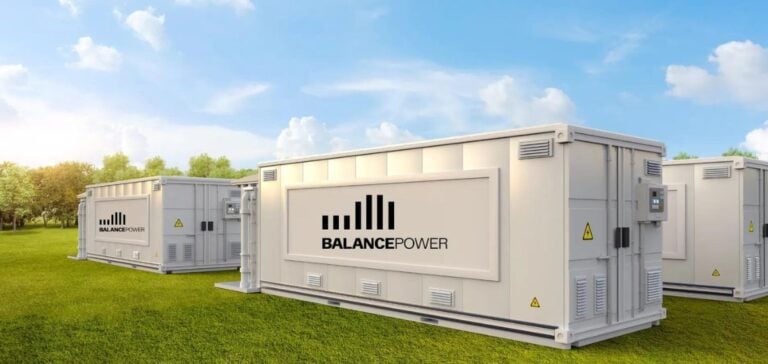Balance Power’s 49.5MW/99MWh battery energy storage project in Hinckley receives planning approval from Rugby Borough Council.
The storage system is designed to store surplus renewable energy and redistribute it at times of peak demand, enabling more efficient management of electricity supply.
The growing importance of energy storage in a grid dominated by intermittent sources, such as wind and solar, makes it an essential part of the UK’s energy strategy.
The project comprises 28 battery units and aims to improve grid flexibility by reducing the need to rely on traditional thermal power stations during periods of high demand.
This ability to modulate electricity supply contributes to better integration of renewable energies and more optimal use of existing infrastructure.
Impact on CO2 emissions and life cycle management
The Hinckley facility could reduce CO2 emissions by almost 20,000 tonnes a year, equivalent to taking 4,300 cars off the road.
The project also includes measures to limit its footprint on the local environment, including the complete restoration of the site after its 40-year life cycle.
Planning calls for the dismantling of equipment and the rehabilitation of the land, an element often required by local authorities to minimize the long-term impact of energy infrastructures.
Commissioning of the site is scheduled for October 2025.
This deadline depends on the construction schedule, which has yet to be confirmed.
Balance Power’s approach is in line with a growing trend in the industry to ensure greater grid flexibility while meeting strict sustainability and resource management standards.
A response to the challenges of grid flexibility
The importance of energy storage facilities continues to grow in the UK, as the share of renewable energies increases.
Battery storage offers an effective solution to the intermittent nature of wind and solar generation, enabling demand to be met in real time without compromising grid stability.
This project is part of a dynamic in which storage is becoming a pillar for maintaining security of supply, especially in times of energy transition.
Balance Power’s experience in managing similar energy projects plays a key role in navigating complex planning processes and aligning performance targets with local and national regulatory requirements.
Since 2017, the company has submitted nearly 40 projects for approval by the relevant authorities, gradually increasing the storage capacity available on the UK grid.
Outlook for the energy storage sector
With almost 2GW of storage projects under development, the sector is showing a dynamic drive to find solutions to enhance grid resilience.
Installations such as Hinckley offer viable options for increasing operational flexibility, stabilizing the grid in the face of supply and demand fluctuations, and effectively integrating new low-carbon generation sources.
The ongoing development of battery storage in the UK is responding to the needs of a transforming grid.
Market players, including independent developers, are adapting their strategies to maximize the benefits of these new infrastructures while minimizing the risks associated with increased reliance on renewable energies.





















